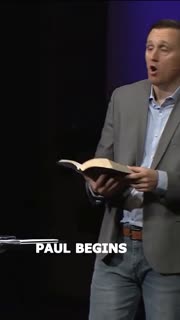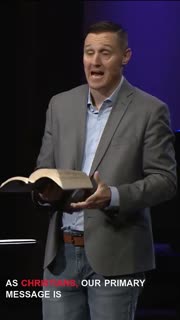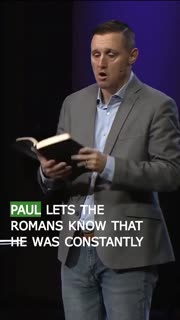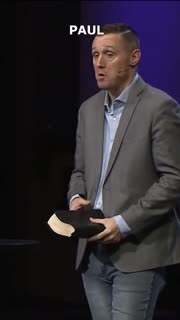Embracing Humility and the Gospel in Community
Devotional
Sermon Summary
Bible Study Guide
Sermon Clips
1. "Paul begins introducing himself by introducing himself as a slave of Jesus Christ. That's what the word bondservant means in this passage. Now, when you stop to think about it, this is an incredible statement for someone like the apostle Paul to have made. Paul had been a highly educated leader in the nation of Israel. Paul had become the greatest missionary the world would ever know. Paul would end up writing one-fourth of the New Testament. And yet, the main way that Paul thought about himself, the first thing he said about himself when he was introducing himself, was that he was a slave of Jesus. What humility! What perspective!" [31:00] (44 seconds)
2. "As Christians, our primary message is not about a religion. As Christians, our message is not primarily about a philosophy. Our message is not primarily a code of ethics or a list of do's and don'ts. As Christians, our primary message is about a person, the Lord Jesus Christ. And so the big question this morning is do you know him? Now, I'm not asking if you know about him. Almost everybody knows something about Jesus. I'm asking do you know Jesus personally? Do you have a living, breathing, personal relationship with Jesus Christ?" [33:50] (40 seconds)
3. "The proof that Jesus is the Son of God is that he rose from the dead. What makes Jesus different from all of the other religious leaders of the world? The difference is that Jesus is the only one who backed up his teachings by being resurrected from the dead. All of the other leaders of all of the other religious systems of the world are still in the grave. Mohammed is still in the grave. Gandhi is still in the grave. Nietzsche is still in the grave. Stephen Hawking is still in the grave. Hugh Hefner is still in the grave. But Jesus is alive. That's the proof. Amen?" [36:05] (41 seconds)
4. "The first thing that Paul wanted to do for the church in Rome is that Paul wanted to thank God for them. Look with me at Romans 1, starting in verse 7. To all who are in Rome, beloved of God, called to be saints, grace to you and peace from God our Father and the Lord Jesus Christ. First, I thank my God through Jesus Christ for you all that your faith is spoken of throughout the whole world. I started this letter by letting the Roman church know that he regularly spent time thanking God for their church. Thanking God for what God was doing in and through their church. Are you thankful for your church? I know that I am." [38:09] (52 seconds)
5. "Paul lets the Romans know that he was constantly praying for their church. In fact, he said that he was praying for their church always and without ceasing. What about us? How often do we pray for our church? Could we say, like the Apostle Paul, that we pray for our church always and without ceasing? What I've found, even often in my own life, is that our prayers often tend to be so self-centered. But we need to make sure that we get some church-centered prayers included as we pray." [41:19] (34 seconds)
6. "Paul said that he wanted to find some way to come visit them because he longed to see them. Paul longed to be with the people in that church even though they were people he had never even met before. If Paul longed to be with the people in a church that he had never even been to before, how much more should we want to be with the people of our church? I mean, that's kind of just Christianity 101, isn't it? Spending time with other Christians, together in our local church. And so here's the question. Do we long to be with the people of our church?" [45:12] (36 seconds)
7. "What the Surgeon General is worried about is what we already know from the Bible, that we are not designed to be alone. Christians do not do well on their own. We are meant to be in community. And churches are God's way of getting us believers the kind of community that we need in the Christian life. Now, it is one level of community to come to the church services. That's great, that's awesome, that is so important. But it's even a deeper level of community to get into a life group. Because a life group is where you can make friends and a life group is where you can build relationships with other people." [48:13] (40 seconds)
8. "Paul said that he wanted to give them a gift. What was the gift? A gift of helping them to grow spiritually. Paul wanted to help the people in their church to grow. Do we want to help the people in our church to grow? Did you know that we have well over 1,600 people in our church who serve in official leadership roles within our church? And that's astounding. I am thankful for that. I'm excited about that. I praise God for that. But do you know what? That's not enough. Because the Bible says we are all supposed to be helping each other grow spiritually, and we have way more than 1,600 members in our church." [50:12] (42 seconds)
9. "Paul was ready and willing to do whatever it takes to help the Roman church to grow and also to help them lead more people to Christ in their city. Now, Rome was a huge city, the capital city of the massive Roman Empire. But, like most big cities, it was also a city filled with moral decay. It was swarming with people, bustling with energy, but as lost as can be. And Paul had a heart to reach that city for Christ. What about us? Do we have the same heart? Paul was ready to preach the gospel in the city of Rome. What about us? Are we ready to preach the gospel here in Bakersfield?" [54:28] (46 seconds)
10. "The message I want to share with you this morning is about what Jesus has already done for you. You see, the Bible says that Jesus loves you so much that he already came into this broken world so that you could be saved. Jesus already lived the perfect sinless life in your place so that you could become righteous. Jesus already died on the cross to take the punishment that you deserve so that you could be forgiven. And Jesus has already come back from the dead so that you can have eternal life. And so because of all that Jesus has already done for you, the Bible says anyone who will turn away from their old life, and who will surrender their life to Jesus and believe in him, can be saved, can be forgiven, and can be transformed." [56:45] (56 seconds)
Ask a question about this sermon
2. "As Christians, our primary message is not about a religion. As Christians, our message is not primarily about a philosophy. Our message is not primarily a code of ethics or a list of do's and don'ts. As Christians, our primary message is about a person, the Lord Jesus Christ. And so the big question this morning is do you know him? Now, I'm not asking if you know about him. Almost everybody knows something about Jesus. I'm asking do you know Jesus personally? Do you have a living, breathing, personal relationship with Jesus Christ?" [33:50] (40 seconds)
3. "The proof that Jesus is the Son of God is that he rose from the dead. What makes Jesus different from all of the other religious leaders of the world? The difference is that Jesus is the only one who backed up his teachings by being resurrected from the dead. All of the other leaders of all of the other religious systems of the world are still in the grave. Mohammed is still in the grave. Gandhi is still in the grave. Nietzsche is still in the grave. Stephen Hawking is still in the grave. Hugh Hefner is still in the grave. But Jesus is alive. That's the proof. Amen?" [36:05] (41 seconds)
4. "The first thing that Paul wanted to do for the church in Rome is that Paul wanted to thank God for them. Look with me at Romans 1, starting in verse 7. To all who are in Rome, beloved of God, called to be saints, grace to you and peace from God our Father and the Lord Jesus Christ. First, I thank my God through Jesus Christ for you all that your faith is spoken of throughout the whole world. I started this letter by letting the Roman church know that he regularly spent time thanking God for their church. Thanking God for what God was doing in and through their church. Are you thankful for your church? I know that I am." [38:09] (52 seconds)
5. "Paul lets the Romans know that he was constantly praying for their church. In fact, he said that he was praying for their church always and without ceasing. What about us? How often do we pray for our church? Could we say, like the Apostle Paul, that we pray for our church always and without ceasing? What I've found, even often in my own life, is that our prayers often tend to be so self-centered. But we need to make sure that we get some church-centered prayers included as we pray." [41:19] (34 seconds)
6. "Paul said that he wanted to find some way to come visit them because he longed to see them. Paul longed to be with the people in that church even though they were people he had never even met before. If Paul longed to be with the people in a church that he had never even been to before, how much more should we want to be with the people of our church? I mean, that's kind of just Christianity 101, isn't it? Spending time with other Christians, together in our local church. And so here's the question. Do we long to be with the people of our church?" [45:12] (36 seconds)
7. "What the Surgeon General is worried about is what we already know from the Bible, that we are not designed to be alone. Christians do not do well on their own. We are meant to be in community. And churches are God's way of getting us believers the kind of community that we need in the Christian life. Now, it is one level of community to come to the church services. That's great, that's awesome, that is so important. But it's even a deeper level of community to get into a life group. Because a life group is where you can make friends and a life group is where you can build relationships with other people." [48:13] (40 seconds)
8. "Paul said that he wanted to give them a gift. What was the gift? A gift of helping them to grow spiritually. Paul wanted to help the people in their church to grow. Do we want to help the people in our church to grow? Did you know that we have well over 1,600 people in our church who serve in official leadership roles within our church? And that's astounding. I am thankful for that. I'm excited about that. I praise God for that. But do you know what? That's not enough. Because the Bible says we are all supposed to be helping each other grow spiritually, and we have way more than 1,600 members in our church." [50:12] (42 seconds)
9. "Paul was ready and willing to do whatever it takes to help the Roman church to grow and also to help them lead more people to Christ in their city. Now, Rome was a huge city, the capital city of the massive Roman Empire. But, like most big cities, it was also a city filled with moral decay. It was swarming with people, bustling with energy, but as lost as can be. And Paul had a heart to reach that city for Christ. What about us? Do we have the same heart? Paul was ready to preach the gospel in the city of Rome. What about us? Are we ready to preach the gospel here in Bakersfield?" [54:28] (46 seconds)
10. "The message I want to share with you this morning is about what Jesus has already done for you. You see, the Bible says that Jesus loves you so much that he already came into this broken world so that you could be saved. Jesus already lived the perfect sinless life in your place so that you could become righteous. Jesus already died on the cross to take the punishment that you deserve so that you could be forgiven. And Jesus has already come back from the dead so that you can have eternal life. And so because of all that Jesus has already done for you, the Bible says anyone who will turn away from their old life, and who will surrender their life to Jesus and believe in him, can be saved, can be forgiven, and can be transformed." [56:45] (56 seconds)










